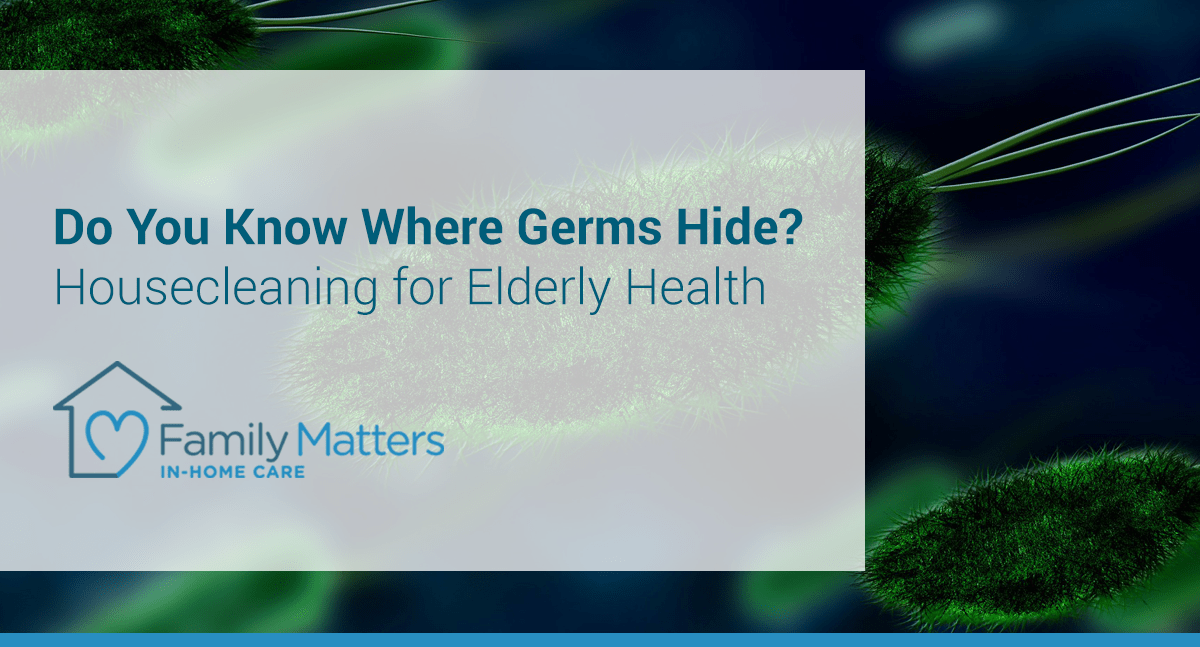
Do You Know Where Germs Hide? Housecleaning for Elderly Health
Keeping elderly loved ones healthy requires attention to many things; medication, sleep, fall prevention, and good nutrition. It also requires good hand washing and housekeeping practices to prevent the spread of infection. Regardless of how careful you are to clean surfaces in the home, germs can hide in unsuspecting places. Here are some things that you may think to clean regularly.
Smartphones
Think of everything you do during the day; cook, type, clean children’s faces, drive the car, enter exit stores and offices, etc. Now think of the number of times you touch your phone after doing each one of those things. Every touch transfers germs. Your phone gets very dirty, yet we rarely clean it. The screen can quickly become a breeding ground for germs. So can other digital devices like tablets, Kindles, other e-readers and laptop computers.
TV Remote
Everyone in the family may handle the remote, with varying degrees of dirt and germs on their hands that are automatically transferred the remote. If you or your family members eat while watching TV, bits and pieces of food may be transferred to the surface of the remote as well. Time to clean the remote!
The Sink Sponge
The very item that you use to clean things in the kitchen retains a lot of dirt, germs and bacteria. The sponge spends a lot of time being damp and warm, the perfect environment for the growth of bacteria. If you wipe up things like raw chicken juice, salmonella bacteria may grow in the sponge as well. Many people boil, microwave, or clean their sponges in the dishwasher, but it doesn’t do a thorough job. It’s estimated that only 60 percent of the bacteria in the sponge is eliminated that way. The best way to have a clean sponge is to replace it every week.
Cash
Where was that dollar bill been before it landed in your hands? U.S. bills attract a lot of germs due to the nature of their materials; believe it or not they are made of 75 percent cotton and 25 percent linen. Fecal bacteria, mold and yeast cling to bills and them make their way onto your hands. Always wash your hands thoroughly after handling paper money.
Washer & Dryer
Your laundry center could be spreading colds through the family. If you don’t wash with hot water and dry the clothes with high heat, the laundry process will not kill the rotavirus, which is responsible for the common cold. If it won’t ruin the clothes, make sure to wash them in water that is at least 140 degrees fahrenheit, especially if someone in the family has a cold. The same goes for washing towels, rags and any other items the sick person may have come in contact with. Once in a while, run a hot cycle through the washer and dryer without any clothes to clean the bacteria from the appliances.
Kitchen Towels
Your kitchen towel could be contaminating your kitchen. One study was reported by Medicinenet.com and it’s a great example of how this happens:
Researchers observed 123 parents between the ages of 20 and 45 to find out how they work in their kitchens. They were asked to prepare two meal items; one with raw meat and one a fruit salad. The meat had been laced with a harmless but detectable bacteria so researchers could detect what items in the kitchen had become contaminated with it. Researchers discovered at the end of the study that the filthiest item in the kitchen was the hand towel. Here’s why:
The participants rarely washed their hands effectively while cooking the two meals. They either washed too quickly or didn’t use soap, but usually dried their hands on the towel. That left bacteria on the towels which caused cross contamination between the raw meat and the fruit salad: 90 percent of the salads had been contaminated with bacteria.
To avoid this wash your hands for 20 seconds and replace the kitchen towel with a clean one each week.
Your Handbag
You take it everywhere you go, setting it on the floor, tables, chairs, park benches and other surfaces. Every time you do it picks up more bacteria. Scientists have studied “handbag contamination” and they found the following:
- One in every 5 handbag handles contains enough bacteria to pose a threat to health
- In a sample of 50 purses, one in four tested positive for E.coli, which can cause stomach cramping and diarrhea
To avoid this, wipe down your purse regularly with a sanitizing wipe.
It’s easy to think of cleaning the usual high-traffic areas like kitchen counters and dishes. It’s just as important to remember to clean the things that get a great deal of use every day, inside and outside the home. Cleaning these items thoroughly can help to keep your elderly loved one safe from bacteria that loves to grow in hidden places.
If you or your family member is considering in-home care as part of a plan to age in place, contact Family Matters In-Home Care today for a free consultation. Our team is dedicated to supporting your family and helping older adults enjoy life in the comfort of their own home for as long as possible.
Some of the services offered by Family Matter In-Home Care include: Alzheimer’s & Dementia Care, Bed & Wheelchair Transfer Assistance, Companionship, Housekeeping & Meal Preparation, Personal Care, Recovery Care, and Transportation.
